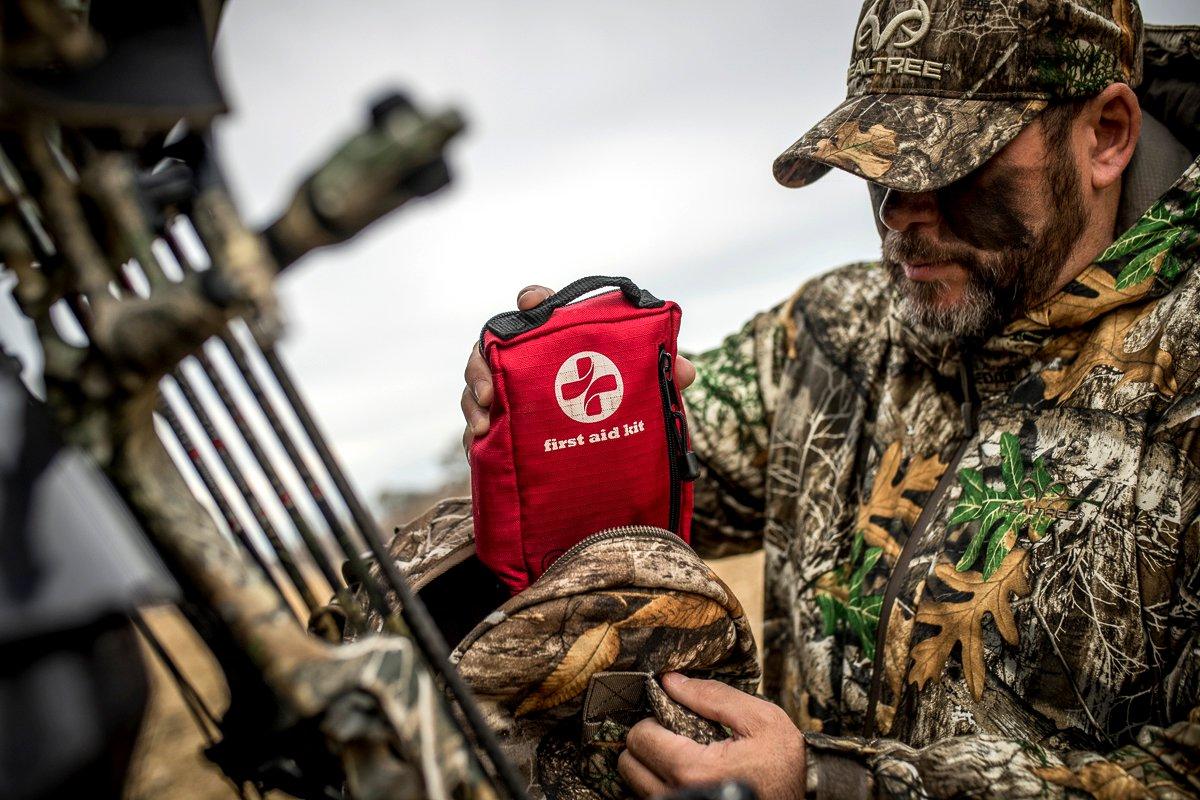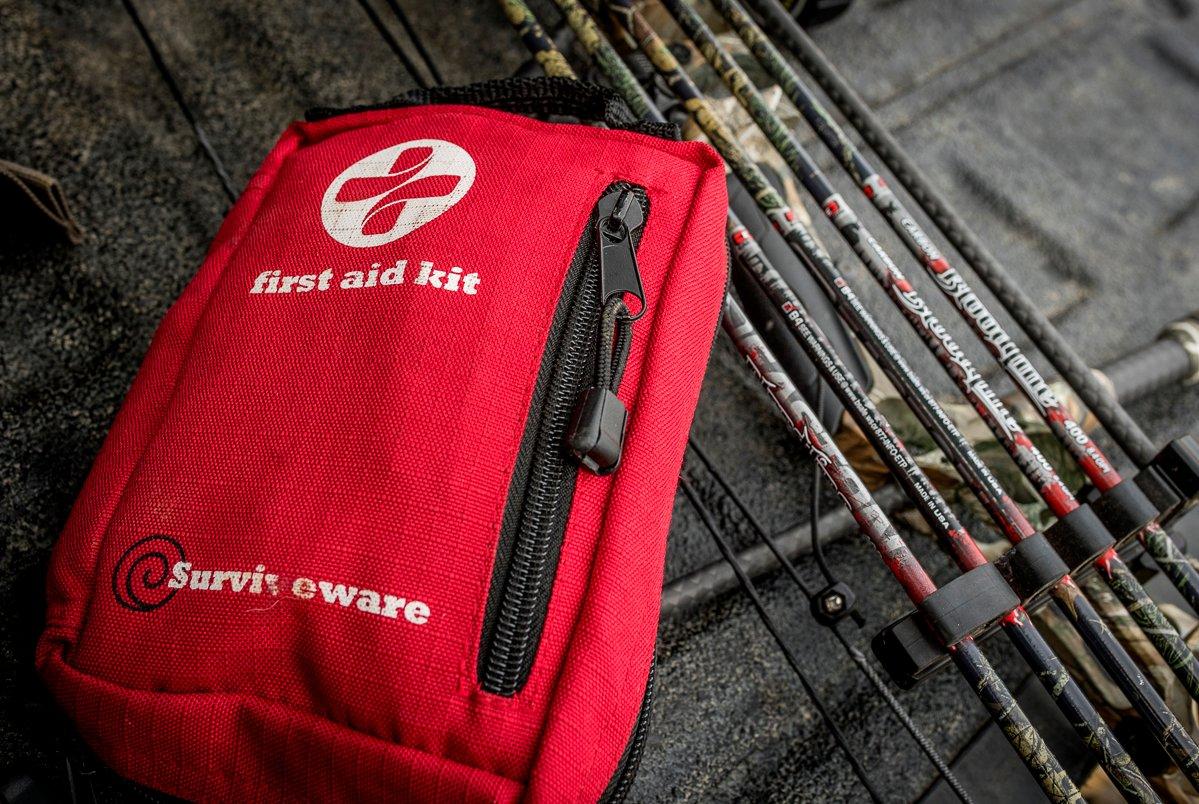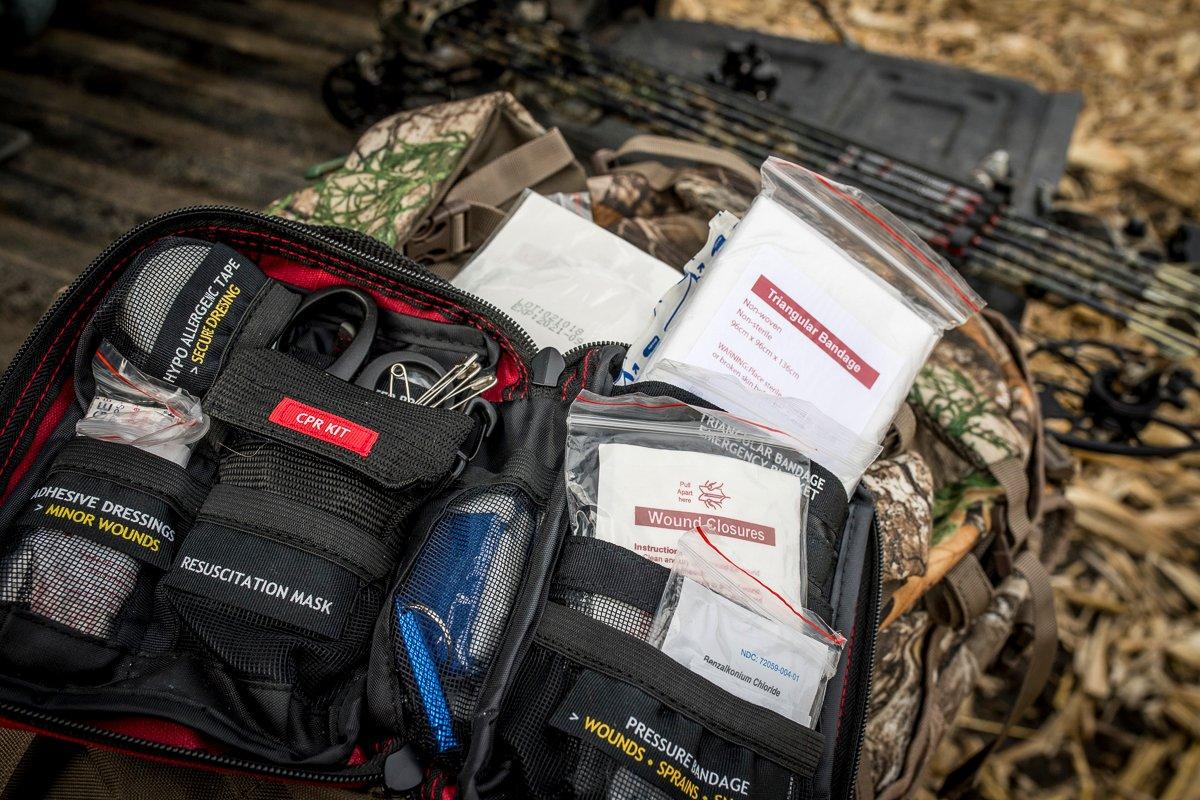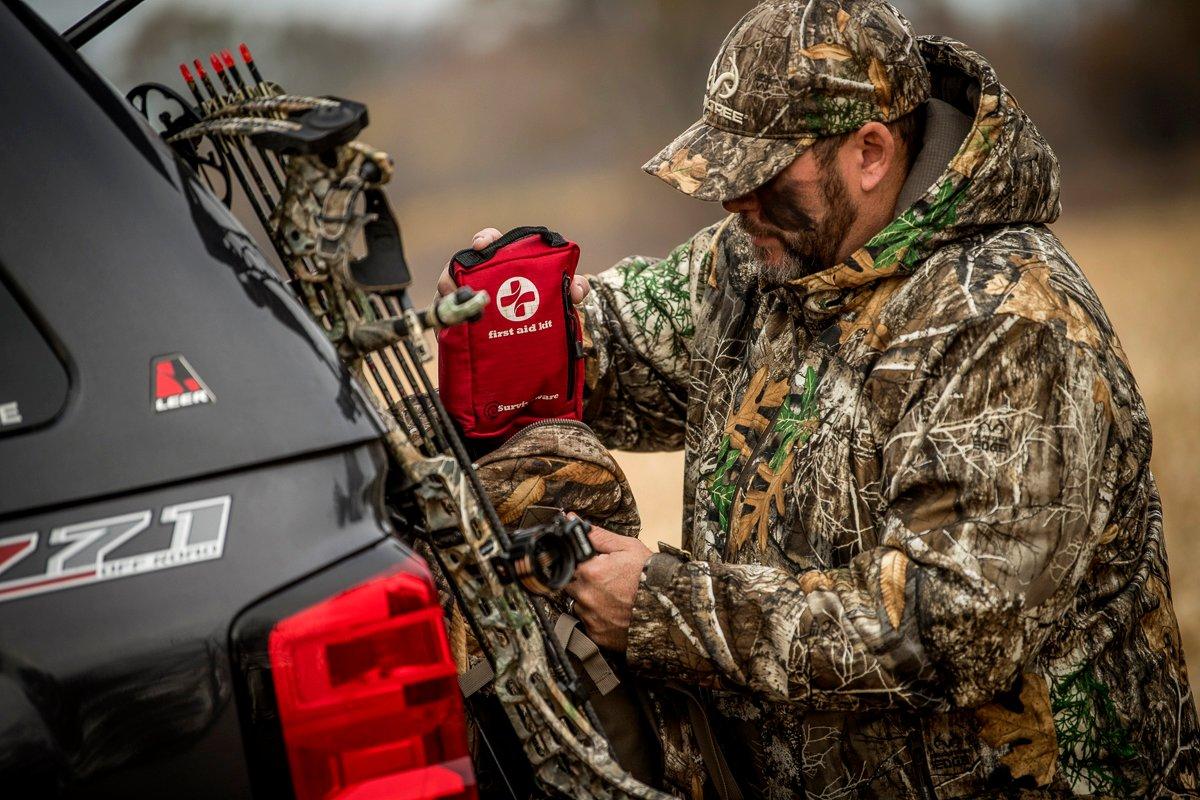Learn how to prepare and react when bad luck strikes with a vengeance
That looks bad. That was all I said as I looked at the blood gushing from my buddy's hand. An hour earlier, he'd sunk an arrow in a Booner whitetail and got a little careless while field-dressing the deer. We typically open the ribcage to make the trachea easier to find, but this time, he understandably wanted to preserve more of the hide for a shoulder mount and tried to feel his way in there.
Two things worked in his favor. First, I was standing next to him when his blade slipped. Second, we were hunting on his back 40, right behind his house. His wife took him to the ER for 12 stitches on the base of his thumb while I finished his buck.
In hindsight, one thing stands out: how quickly we went from high-fiving and selfie-taking to almost crying and Sunday-praying. Luckily, our hunt was already finished, but it highlighted that our mortality can be as equally at risk as that of the animals we hunt — a fact some people don't learn until it's too late.
Dr. Steve Salyers has practiced medicine for more than 30 years. An orthopedic surgeon, the Kentucky native and Tennessee resident has extensive experience in sports injuries and trauma. He's also seen his share of treestands, boats and blinds, and offered some advice on preventing bad situations from becoming disastrous.
(Don't Miss: Presidential Blades)
A Little Housekeeping
First of all, I would guess that far more hunters are killed in automobile accidents going to and from the field than actually suffer accidents while hunting or fishing, Salyers said. What would be normal health events in the field are also a tremendous risk because of how remote our hunting locations usually are. All of us that choose to spend time in nature need to go to our annual checkup and try to live a generally healthy lifestyle.
Salyers said preventing something from happening is easier than fixing something that occurs.
Your preparation to take an animal should be matched by your preparation to stay safe, he said. If you hunt alone, always tell someone exactly where you're going to be. Share a pin with them, or give them a waypoint. Tell them when you're going in and coming out. Let them know you made it safely to your stand or blind. Tell them when you're about to climb down and when you made it to the ground. All these things can give a roadmap to first responders in the unlikely event you need help. We often address our hunting what-ifs, but we fail to do that with our health preparation and first aid.
Salyers also shared specific treatments for some common outdoor injuries. However, it's important to remember that although these treatments are potential solutions, every circumstance is unique. These applications might not be appropriate for everyone, and getting the right help is the most important step.
Major Lacerations
In the outdoors, sharp objects are necessary. Knives, broadheads, fishhooks, axes and saws are tools of the trade, and unintentional lacerations are common. Salyers provided tips for stopping bleeding.
Blood loss is one of the big things that will take your life if not controlled, he said. You don't need lasting treatments. You want to extend your timeframe so you can get to the hospital and get fixed up. In my standard hunting pack, I always pack bandages, QuikClot and a tourniquet.
First try to control bleeding with a pressure dressing directly on the wound. If that doesn't stop the bleeding, apply QuikClot. If substantial bleeding continues, apply a tourniquet. Tourniquets can literally save your life, but they can also cause additional harm. Be very educated on how and when to use one, because it can cause damage to other parts of the limb. If it's life or death, use it. If the bleeding is stopping with a pressure bandage, use that instead.
(Don't Miss: The Best—And Worst—Hunting Fads of the Past 40 Years)
Allergic Reactions
For some people, allergic reactions can lead to severe anaphylaxis and even death. People that have severe allergies need to have a plan for the worst.
Allergic reactions are a threat that requires advanced preparation, Salyers said. Benadryl would be one of the things you absolutely need in your first-aid pack, especially if you have known allergies. Even if you don't, it's a good idea to carry a dose or two in case you have an allergy you don't know about or for someone hunting with you.
If you have a severe allergy to something common in the woods, like bees, you need to keep your EpiPen with you, especially if you're going to be spending time deep in the bush. Make sure to educate your hunting partner on where you keep it in your pack, where you need to be stuck and what signs indicate you need a dose.
Heart Attack
Although we might think more exotic events are the biggest risk afield, traditional health problems are much more common and can be far deadlier when proper help is farther away. Heart attacks can be a tremendous risk, especially for people who have a family history or are overweight.
First of all, know the classic signs of a heart attack, Salyers said. Chest pain obviously is an indicator. Unusual shortness of breath or pain in the jaw, neck, arms or shoulders is also a common symptom.
Salyers said people who are overweight, have a family history of heart problems or who have experienced previous heart attacks should pack uncoated aspirin afield.
It should be a piece of gear that you view as critical to your hunt as your calls and camo, he said. If you think you're having a heart attack, chew up an aspirin instead of swallowing it so it will be absorbed more quickly into your body. Then use your phone to call a buddy to pick you up instead of walking out. The exertion of walking out will exacerbate the problem.
(Don't Miss: Do Biologists Listen to Hunters?)
Treestand Fall
Please, please, please wear a safety belt in the deer stand, Salyers said. Rule No. 1 of not falling out of a treestand is don't fall out of the treestand. If possible, hunt with a buddy. That can be someone physically hunting with you or a virtual buddy. Just make sure to let someone know where you are and that you made it safely into and out of your stand.
If you fall headfirst and suffer head and neck trauma, you likely won't survive, Salyers said. If you land on your legs, you might break a hip but will likely suffer a lower leg fracture. And if you land on an object such as a log, you might have a back fracture with a spinal cord injury and will likely suffer paralysis.
Also, make sure to have your phone on your person, not in a daypack, he said. How many times have we heard about a guy that fell out of a treestand conscious but paralyzed with his daypack hanging on the hook in the treestand?
Mechanical Injury
Blunt trauma can get gnarly. Salyers said stability is the most important factor.
Stabilizing the bone prevents it from moving around and damaging critical tissue that has not been damaged, he said. If there is a wound, you want to get as clean of a dressing as you can without contaminating the wound. Put some betadine on it, apply sterile gauze, and wrap it.
Salyers said hunters can use several small sticks or limbs to make a splint.
Lay the splint alongside the bone, and wrap it with rope or cloth in a snug manner, he said. If the injury is to a joint, splint it in a way that prevents it from bending. If you can bear weight on the injured area, it's likely not that bad. Bite a stick, and make it out with some sort of a walking stick or a crutch. If you can't bear weight on it, stabilize it and crawl out. Leave your boot on, and strap the splint to your boot with straps or shoelaces. If an upper body injury occurs, bind your arm to your chest and walk out.
(Don't Miss: When is it OK to Hunt a Property Line?)
Hypothermia and Hyperthermia
Water can be a blessing and a curse. When experiencing hyperthermia (overheating), the body needs water. Conversely, hypothermia is often caused from someone getting wet in cold or windy weather.
Sometimes the biggest risks are in familiar places close to home, Salyers said. Putting up deer stands and brushing duck blinds in the summer heat can be very risky. In both cases, you're experiencing heavy lifting and maximum exertion. Without proper hydration, someone can die.
Hyperthermia and hypothermia are sort of opposites. In both cases, the body can't regulate itself and needs help. In one case, the body needs cold liquids, rest and a cold shower. Ice packs under arms and in the groin can also speed up cooling. In the other, the body needs warm liquids, insulation (blankets or clothes) and possibly fire.
Conclusion
Preparation goes a long way toward avoiding pitfalls. In general, maintaining overall good health will help prevent bad things from happening or being fatal. Be sure to memorize the necessary techniques so you're ready if the worst happens.











